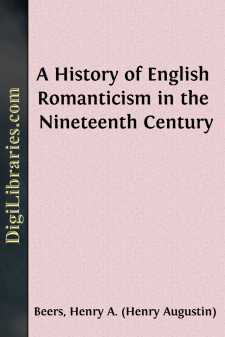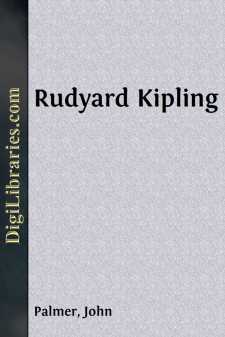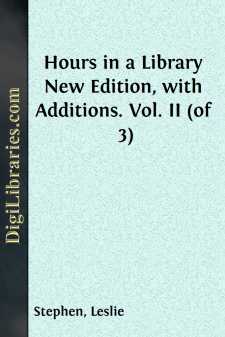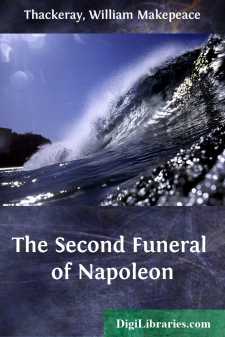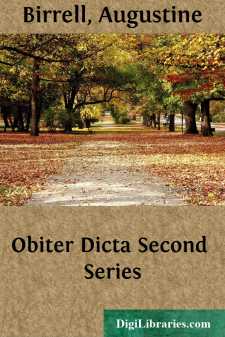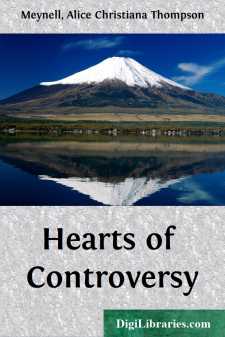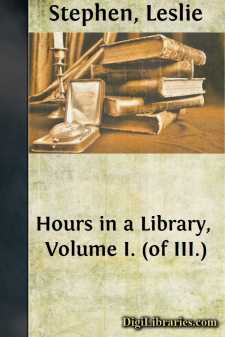Literary Criticism
- American 18
- Ancient and Classical 3
- Asian 1
- Australian & Oceanian 1
- Books & Reading 8
- Caribbean & Latin American 2
- Drama 2
- English, Irish, Scottish, Welsh
- European 7
- General 37
- Horror 1
- Humor 2
- Jewish 2
- Medieval 2
- Middle Eastern 3
- Poetry 7
- Renaissance 6
- Russian & Former Soviet Union 1
- Shakespeare 27
English, Irish, Scottish, Welsh Books
Sort by:
CHAPTER I. Walter Scott.[1] It was reserved for Walter Scott, "the Ariosto of the North," "the historiographer royal of feudalism," to accomplish the task which his eighteenth-century forerunners had essayed in vain. He possessed the true enchanter's wand, the historic imagination. With this in his hand, he raised the dead past to life, made it once more conceivable, made it even...
more...
by:
John Palmer
I There is a tale of Mr Kipling which relates how Eustace Cleever, a celebrated novelist, came to the rooms of a young subaltern and his companions who were giving an account of themselves. Eustace Cleever was a literary man, and was greatly impressed when he learned that one of the company, who was under twenty-five and was called the Infant, had killed people somewhere in Burma. He was suddenly...
more...
CHAPTER I.INTRODUCTORY. Village libraries—Difficulties of travel—Literary Societies in the Highlands—Gaelic books—Happiness and geniality of natives—Oban to Gairloch—Winter sailing—A crofting village—Horrors of the Minch—Notes on Lewis—Highland doctors—Hotels and anglers—Recent books—Military—Moray Firth—Among the miners—Handloom weaving—Professor Blackie and the...
more...
by:
Leslie Stephen
A book appeared not long ago of which it was the professed object to give to the modern generation of lazy readers the pith of Boswell's immortal biography. I shall, for sufficient reasons, refrain from discussing the merits of the performance. One remark, indeed, may be made in passing. The circle of readers to whom such a book is welcome must, of necessity, be limited. To the true lovers of...
more...
I.—ON THE DISINTERMENT OF NAPOLEON AT ST. HELENA. MY DEAR ——,—It is no en the Voyage from St. Helena asy task in this world to distinguish between what is great in it, and what is mean; and many and many is the puzzle that I have had in reading History (or the works of fiction which go by that name), to know whether I should laud up to the skies, and endeavor, to the best of my small...
more...
I am sorry not to have been able to persuade my old friend, George Radford, who wrote the paper on ‘Falstaff’ in the former volume, to contribute anything to the second series of Obiter Dicta. In order to enjoy the pleasure of reading your own books over and over again, it is essential that they should be written either wholly or in part by somebody else. Critics will probably be found ready to...
more...
SOME THOUGHTS OF A READER OF TENNYSON Fifty years after Tennyson’s birth he was saluted a great poet by that unanimous acclamation which includes mere clamour. Fifty further years, and his centenary was marked by a new detraction. It is sometimes difficult to distinguish the obscure but not unmajestic law of change from the sorry custom of reaction. Change hastes not and rests not, reaction...
more...
by:
Leslie Stephen
OPINIONS OF AUTHORS Libraries are as the shrines where all the relics of the ancient saints, full of true virtue, and that without delusion or imposture, are preserved and reposed.—Bacon, Advancement of Learning. We visit at the shrine, drink in some measure of the inspiration, and cannot easily breathe in other air less pure, accustomed to immortal fruits.—Hazlitt's Plain Speaker. What a...
more...
by:
Edmund Gosse
PREFACE: ON FLUCTUATIONS OF TASTE When Voltaire sat down to write a book on Epic Poetry, he dedicated his first chapter to "Differences of Taste in Nations." A critic of to-day might well find it necessary, on the threshold of a general inquiry, to expatiate on "Differences of Taste in Generations." Changes of standard in the arts are always taking place, but it is only with advancing...
more...
by:
Lady Gregory
RAFTERY I. One winter afternoon as I sat by the fire in a ward of Gort Workhouse, I listened to two old women arguing about the merits of two rival poets they had seen and heard in their childhood. One old woman, who was from Kilchreest, said: 'Raftery hadn't a stim of sight; and he travelled the whole nation; and he was the best poet that ever was, and the best fiddler. It was always at my...
more...


